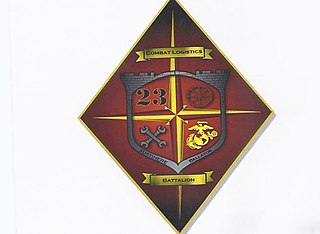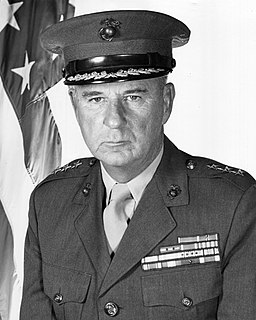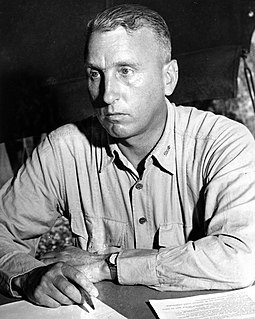Related Research Articles

Charles Chandler Krulak is a retired United States Marine Corps four-star general who served as the 31st Commandant of the Marine Corps from July 1, 1995 to June 30, 1999. He is the son of Lieutenant General Victor H. "Brute" Krulak, who served in World War II, Korea, and Vietnam. He was the 13th President of Birmingham-Southern College after his stint as a non-executive director of English association football club Aston Villa.

Carl Epting Mundy Jr. was a United States Marine Corps four-star general who served as the 30th Commandant of the Marine Corps and a member of the Joint Chiefs of Staff from July 1, 1991 until his retirement on June 30, 1995, after 42 years of service. He was notable for his opposition to military service by gay people and for helping to shape the military's "don't ask, don't tell" policy of 1993.

Harry Schmidt was a United States Marine Corps general. During World War II, he served as the commanding general of the Fourth Marine Division during the battles of Kwajalein in the Marshall Islands and Saipan in the Mariana Islands, and as commanding general of the Fifth Amphibious Corps during the battles of Tinian in the Marianas and Iwo Jima in the Volcano Islands.

Louis Hugh Wilson Jr. was United States Marine Corps four-star general and a World War II recipient of the Medal of Honor for his actions during the Battle of Guam. He served as the 26th commandant of the Marine Corps from 1975 until his retirement from the Marine Corps in 1979, after 38 years of service.

Alfred Mason Gray Jr. is a retired United States Marine Corps four-star general who served as the 29th Commandant of the Marine Corps from 1 July 1987 until his retirement on 30 June 1991 after 41 years of service.

The Mountain Warfare Training Center (MWTC) is a United States Marine Corps installation located in Pickel Meadows on California State Route 108 at 6,800 feet (2,100 m) above sea level in the Toiyabe National Forest, 21 miles (34 km) northwest of Bridgeport, California. The training center exists to train units in complex compartmented terrain.

Henderson Hall is a military installation of the United States Marine Corps (USMC) located in Arlington County, Virginia, near the Pentagon, on the southern edge of the Arlington National Cemetery and next to Fort Myer. Currently, it is part of Joint Base Myer–Henderson Hall. Henderson Hall is named for Brevet Brigadier General Archibald Henderson, the fifth and longest-serving Commandant of the Marine Corps.

William L. "Spider" Nyland, a veteran of the Vietnam War, is a retired United States Marine Corps four-star General who served as the Assistant Commandant of the Marine Corps from 2002 to 2005. He retired from the Marine Corps in November 2005 after over 37 years of distinguished service.
Hispanics and Latinos in the United States Marine Corps, such as Private France Silva who during the Boxer Rebellion became the first Marine of the thirteen Marines of Latin American descent to be awarded the Medal of Honor, and Private First Class Guy Gabaldon who is credited with capturing over 1,000 enemy soldiers and civilians during World War II, have distinguished themselves in combat. Latinos have participated as members of the United States Marine Corps in the Boxer Rebellion, World War I, the American intervention in Latin America also known as the Banana Wars, World War II, the Korean War, the Vietnam War, the Gulf War and most recently in the military campaigns of Afghanistan and Iraq.

The United States Marine Corps (USMC), also referred to as the United States Marines, is the maritime land force service branch of the United States Armed Forces responsible for conducting expeditionary and amphibious operations through combined arms, implementing its own infantry, armor, artillery, aerial and special operations forces. The U.S. Marine Corps is one of the eight uniformed services of the United States.

Gordon Donald Gayle was a highly decorated officer in the United States Marine Corps with the rank of brigadier general and historian. A veteran of World War II and Korea, he distinguished himself as commanding officer, 2nd Battalion, 5th Marines and received Navy Cross, the United States military's second-highest decoration awarded for valor in combat.

The Marine Forces Reserve, also known as the United States Marine Corps Reserve (USMCR) and the U.S. Marine Corps Forces Reserve, is the reserve force of the United States Marine Corps. It is the largest command, by assigned personnel, in the U.S. Marine Corps. Marines in the Reserve go through the same training and work in the same Military Occupational Specialties (MOS) as their active-duty counterparts. The United States Marine Corps Reserve was established when Congress passed the Naval Appropriations Act of 29 August 1916, and is responsible for providing trained units and qualified individuals to be mobilized for active duty in time of war, national emergency, or contingency operations.

Combat Logistics Battalion 23(CLB-23) is a Military Logistics Battalion of the United States Marine Corps Reserve. The unit is based out of the New Orleans, Louisiana with Marine Forces Reserve and headquartered in Fort Lewis, WA under the command of the 4th Marine Logistics Group.

Francis Butler Loomis Jr. was a decorated officer of the United States Marine Corps, who reached the rank of major general. He is most noted as executive officer of the 1st Defense Battalion during the Shelling of Johnston and Palmyra and later as Logistic Officer of III Marine Amphibious Corps during Battle of Okinawa. He was the son of United States Assistant Secretary of State, Francis B. Loomis.

Leonard Baker Cresswell was a highly decorated officer of the United States Marine Corps with the rank of major general. He is most noted for his service as commanding officer of 1st Battalion, 1st Marines during Guadalcanal Campaign. Cresswell later served as commanding general of Troop Training Unit, Atlantic Fleet and completed his career as Director of the Staff of the Inter-American Defense Board.

George William Smith was a decorated officer in the United States Marine Corps who rose to the rank of major general. He began his 34-year career as an Enlisted Reservist during World War II, later integrating into the regular Marine Corps and distinguishing himself as commanding officer, 1st Battalion, 9th Marines during the Vietnam War. His last assignment was commanding general, 3rd Marine Division on Okinawa, Japan.

Robert Burneston Luckey was a decorated officer in the United States Marine Corps with the rank of lieutenant general. A veteran of several wars, Luckey completed his career as commanding general, Fleet Marine Force, Atlantic.

John Houghton Griebel was a decorated officer in the United States Marine Corps with the rank of Brigadier general. A veteran of Nicaraguan Campaign and Yangtze Patrol, he later distinguished himself as commanding officer, 5th Marine Regiment during the Battle of Okinawa.

Robert Prescott Keller was a highly decorated Naval aviator in the United States Marine Corps with the rank of Lieutenant general. He began his career as reserve pilot during World War II, he shot down one enemy aircraft and damaged two others during New Britain campaign. Keller distinguished himself again as Pilot during Korean War and later reached general's rank during Vietnam War.

William Charles Chip was a decorated officer in the United States Marine Corps with the rank of major general. A veteran of three wars, Chip distinguished himself as battalion executive officer in Korea and later as commanding general, Task Force Hotel during Vietnam War.
References
- ↑ "404".
- ↑ http://usmc-mccs.org/kvn/ USMC Retrieved on 2008-07-04
- ↑ on-line
- ↑ "Archived copy". Archived from the original on 2007-07-01. Retrieved 2008-07-05.CS1 maint: archived copy as title (link) USMC Retrieved on 2008-07-04
- ↑ http://usmc.mccs.org/kvn/downloads/MARFORRES_Difference.pdf%5B%5D USMC Retrieved on 2008-07-04
- ↑ http://usmc.mccs.org/kvn/%5B%5D USMC Retrieved on 2008-07-04